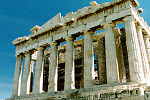About…
Athens in the Bible
Athens is the capital city of ancient Attica, the most celebrated city of the ancient world, the seat of Greek literature and art during the golden period of Grecian history.
Athens is one of the world’s oldest cities, with its recorded history spanning over 3,400 years, and its earliest human presence beginning somewhere between the 11th and 7th millennia BC. It is believed that Athens has been continuously inhabited for at least 5,000 years (3000 BC).
Its inhabitants are called Athenians and were fond of novelty (Acts 17:21), and were remarkable for their zeal in the worship of the false gods. It was a sarcastic saying of the Roman satirist that it was “easier to find a god at Athens than a man.”
In antiquity, it was debated whether Athens took its name from its patron false goddess Athena or Athena took her name from the city. Modern scholars generally agree that it was the latter. She is the goddess of wisdom and war.
On his second missionary journey the Apostle Paul visited this city (Acts 17:15; compare 1 Thess. 3:1), and delivered in the Areopagus his famous speech (17:22-31). The altar of which Paul there speaks as dedicated “to the [properly an] unknown God” (23) was probably one of several which bore the same inscription.
It is supposed that they originated in the practice of letting loose a flock of sheep and goats in the streets of Athens on the occasion of a plague, and of offering them up in sacrifice, at the spot where they lay down, “to the god concerned.”
Many archaeological ruins and ancient monuments are still visible. The most famous ancient building is the Parthenon. Athens has preserved monuments and structures from the ancient Greeks, Roman, and Byzantine periods.
More information
- Areopagus
- About idolatry and false gods in the Bible
- About idols in the Bible
 About ancient Greece in the Bible
About ancient Greece in the Bible- What are Grecians?
- About the Greek language in the Bible
- About Paul’s 2nd missionary journey
 What are the CITIES OF THE BIBLE? Names, descriptions, locations and types
What are the CITIES OF THE BIBLE? Names, descriptions, locations and types- Who is Paul?
- Places of the Bible
